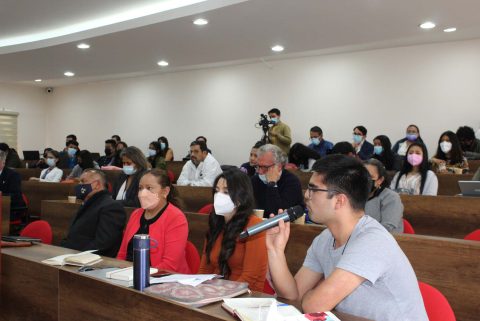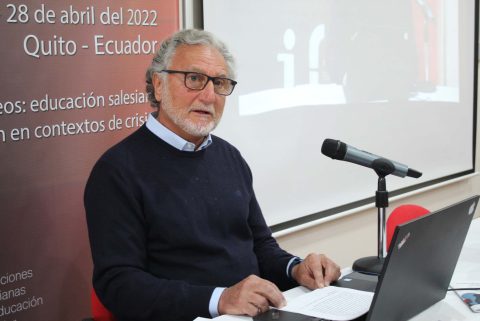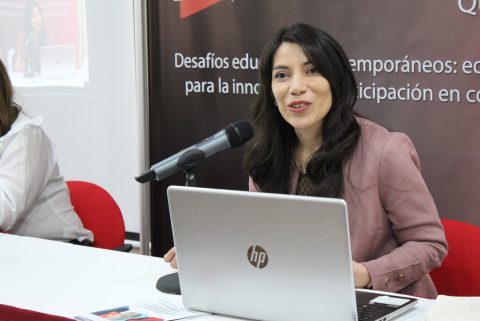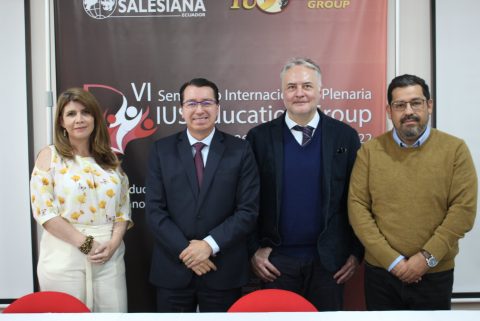
VI International Seminar IUS Education Group
During the first quarter of 2020, the world faced an unexpected health situation. The Covid 19 pandemic, without a doubt, evidenced the fragility of the human being as a species and questioned us about taking care of our life and the ecosystem, that is, the challenge that remains is to think that ecology must be integral, human (General Chapter XXVIII, p.75)
But the pandemic also revealed the conditions of inequality and inequity that still persist in global society. In this scenario of inequalities and uncertainties, educational spaces, at all levels and countries, tried to be the space for meeting and containing young population sectors. However, teacher training, access to technological resources, digital skills installed in each educator, revealed that this space considered as a safeguard also had to face general and own challenges inherent in a context of changes, transformations and social uncertainties.
In this context, the IUS Education Group proposes to create an academic space for reflection, dialogue and exchange of educational experiences, advances and research results produced by researchers from the IUS
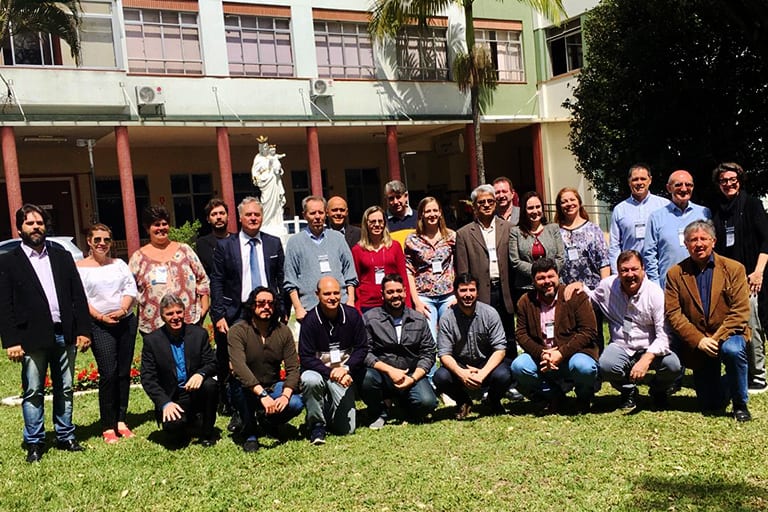
General Objective
To generate a space for reflection on the contemporary educational challenges of the IUS that participate in the Education Group.
General Objective
To generate a space for reflection on the contemporary educational challenges of the IUS that participate in the Education Group.
Specific Objectives
To socialize the results of research and reports of experiences of the educational-pedagogical-pastoral challenges posed by the IUS in response to the contexts, new technologies and current educational demands
To know the socio-educational-pedagogical-pastoral responses in the contexts of contemporary crisis unleashed by the COVID-19 pandemic
To disseminate research results and experience reports to the scientific community through various academic formats and supports.
Specific Objectives
• To socialize the results of research and reports of experiences of the educational-pedagogical-pastoral challenges posed by the IUS in response to the contexts, new technologies and current educational demands.
• To know the socio-educational-pedagogical-pastoral responses in the contexts of contemporary crisis unleashed by the COVID-19 pandemic.
• To disseminate research results and experience reports to the scientific community through various academic formats and supports.

Key dates
• Submission of abstracts: December 31
• Approval of abstracts: January 31
• Registration: Until March 2022
• Submission of full papers: March 18 2022
• Seminar: 26, 27, 28 of Abril 2022
Presentation of academic works
• Research reports: Socialization of research project results according to the thematic lines
• Experience report: Socialization of the narrative product of the critical recovery of the educational experience of the IUS EG in current contexts based on the thematic lines of the seminar


Presentación de Trabajos Académicos
• Research reports: Socialization of research project results according to the thematic lines
• Experience report: Socialization of the narrative product of the critical recovery of the educational experience of the IUS EG in current contexts based on the thematic lines of the seminar
Thematic Lines
Contemporary educational-pastoral challenges of Salesian higher education in the context of crisis.
The complexity of the current social and educational scenarios requires constant reflection, action and critical stance on the part of the IUS in their educational-pastoral and pedagogical journey towards the meeting of young people and in a commitment to educate in political service (Aguinaldo Rector Mayor, 2020). Along these lines, it is proposed to discuss the contemporary challenges faced by Salesian higher education in general and the faculties of education in particular as trainers of educators, in attention, among other things, to the pandemic effects and post-pandemic contexts “new normality” and the challenge accompaniment as an educational strategy.
Forms and spaces for youth participation.
In every Salesian educational environment, the pedagogical proposal places the young subject at the center of the process. The accompaniment and the atmosphere of familiarity, as methodological strategies, promote spaces for youth participation and the construction of citizenships. For this reason, in this line, it is proposed to reflect on the new and perhaps novel spaces for participation and construction of youth citizenships and reconfiguration of Salesian associations based on access to social networks and the appropriate use of them, as well as digital platforms and apps that have configured a new proposal for social interaction and now educational.
Educational innovations in border contexts.
The contexts in which educational innovation is generated are diverse, from Salesian institutions at all educational levels, there is a permanent response to emerging scenarios that arise in school management, in the classroom, in families, in the environment. The participants or actors of the innovations are also diverse: Salesian community, managers, teachers, students, families, community actors, allowing a response and contributions from different perspectives and interests of these social actors. For this reason, in this line, it is expected to reflect and determine the characteristics, possibilities and limits of innovation in Salesian institutions, review the experiences around the common home from the understanding of an integral human ecology and the sustainable future of young people expressed in the encyclical letter Laudato si; innovation in border and marginality contexts: migration, religious and cultural diversity, poverty, popular education, ethnic diversity, work with women in vulnerable situations, violence, new technologies (digital culture), renewable energies, interculturality and ecology
Thematic Lines
Contemporary educational-pastoral challenges of Salesian higher education in the context of crisis.
The complexity of the current social and educational scenarios requires constant reflection, action and critical stance on the part of the IUS in their educational-pastoral and pedagogical journey towards the meeting of young people and in a commitment to educate in political service (Aguinaldo Rector Mayor, 2020). Along these lines, it is proposed to discuss the contemporary challenges faced by Salesian higher education in general and the faculties of education in particular as trainers of educators, in attention, among other things, to the pandemic effects and post-pandemic contexts “new normality” and the challenge accompaniment as an educational strategy.
Forms and spaces for youth participation.
In every Salesian educational environment, the pedagogical proposal places the young subject at the center of the process. The accompaniment and the atmosphere of familiarity, as methodological strategies, promote spaces for youth participation and the construction of citizenships. For this reason, in this line, it is proposed to reflect on the new and perhaps novel spaces for participation and construction of youth citizenships and reconfiguration of Salesian associations based on access to social networks and the appropriate use of them, as well as digital platforms and apps that have configured a new proposal for social interaction and now educational.
Educational innovations in border contexts.
The contexts in which educational innovation is generated are diverse, from Salesian institutions at all educational levels, there is a permanent response to emerging scenarios that arise in school management, in the classroom, in families, in the environment. The participants or actors of the innovations are also diverse: Salesian community, managers, teachers, students, families, community actors, allowing a response and contributions from different perspectives and interests of these social actors. For this reason, in this line, it is expected to reflect and determine the characteristics, possibilities and limits of innovation in Salesian institutions, review the experiences around the common home from the understanding of an integral human ecology and the sustainable future of young people expressed in the encyclical letter Laudato si; innovation in border and marginality contexts: migration, religious and cultural diversity, poverty, popular education, ethnic diversity, work with women in vulnerable situations, violence, new technologies (digital culture), renewable energies, interculturality and ecology.
Instructions for participants
Criteria for the submission of abstracts and full papers.
Summary
• The text must be original and contribute to the thematic axes.
• The abstract must be presented in 2 languages (Spanish and English) with a maximum length of 230 words.
• Keywords: from 3 to 6.
Completed work
• The article must be divided into sections with titles and subtitles.
• The objectives, the methodology, the theoretical references, the debate and / or the results should be made explicit in some of the sections of the chapter.
• Bibliography.
• Length of text should be between 5000 to 7000 words.
• Include a footnote with the name and surname of the author (s), the institution to which it belongs and email. Add a curriculum profile of a maximum of 10 lines to your CV.
• Non-textual elements (tables, graphs, illustrations) will be inserted in the development of the text itself.
• For bibliographic references use APA Seventh.
Account of experiences
• Summary, keywords, introduction, definition of the objective, the object of analysis, the systematization axis, the development and communication of the experience. Conclusions and References.
• Abstract must be presented in 2 languages (Spanish and English) with an extension of 230 words.
• Keywords: 3 to 6 words.
• The length of the text will be 5,000 to 7,000 words.
• The headings of each section will be written in bold and must be numbered.
• Font Times New Roman 12, line spacing 1.5 and margin of three centimeters.
• For bibliographic references use APA Seventh.
Summary
• The text must be original and contribute to the thematic axes.
• The abstract must be presented in 2 languages (Spanish and English) with a maximum length of 230 words.
• Keywords: from 3 to 6.
Completed work
• The article must be divided into sections with titles and subtitles.
• The objectives, the methodology, the theoretical references, the debate and / or the results should be made explicit in some of the sections of the chapter.
• Bibliography.
• Length of text should be between 5000 to 7000 words.
• Include a footnote with the name and surname of the author (s), the institution to which it belongs and email. Add a curriculum profile of a maximum of 10 lines to your CV.
• Non-textual elements (tables, graphs, illustrations) will be inserted in the development of the text itself.
• For bibliographic references use APA Seventh.
Account of experiences
• Summary, keywords, introduction, definition of the objective, the object of analysis, the systematization axis, the development and communication of the experience. Conclusions and References.
• Abstract must be presented in 2 languages (Spanish and English) with an extension of 230 words.
• Keywords: 3 to 6 words.
• The length of the text will be 5,000 to 7,000 words.
• The headings of each section will be written in bold and must be numbered.
• Font Times New Roman 12, line spacing 1.5 and margin of three centimeters.
• For bibliographic references use APA Seventh.
Reception of Abstracts
The selected works will be published in the second book of the IUS Education Group through Editorial Universitaria Abya Yala
Speakers
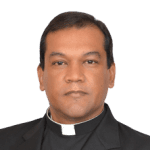





Fr. Oscar Lozano sdb. (General Coordinator of the IUS)
“Opening”
Fr. Juan Cárdenas, Rector of the Salesian Polytechnic University of Ecuador
“Welcome.”
María Sol Villagómez R. (General Coordinator of the IUS Education Group and current Vice-Rector of the Salesian Polytechnic University – Campus Branch Quito )
“Contemporary educational challenges: Salesian education for innovation and participation in crisis contexts”
Day 1 – Fr. Miguel Ángel García sdb. (Italy)
“Contemporary educational-pastoral challenges of Salesian higher education in the context of crisis”
Day 2 – MSc. Vanildes Gonçalves dos Santos (Brazil)
“Forms and spaces for youth participation”
Day 3 – Dr. Roberto Ravera (Italy)
“Educational innovations for higher education. Experience report”

Fr. Oscar Lozano sdb. (General Coordinator of the IUS)
“Opening and Welcome”

Fr. Juan Cárdenas, Rector of the Salesian Polytechnic University of Ecuador
“Welcome.”

María Sol Villagómez R. (General Coordinator of the IUS Education Group and current Vice-Rector of the Salesian Polytechnic University – Campus Branch Quito )
“Contemporary educational challenges: Salesian education for innovation and participation in crisis contexts”

Day 1 – Fr. Miguel Ángel García sdb. (Italy)
“Contemporary educational-pastoral challenges of Salesian higher education in the context of crisis”

Day 2 – MSc. Vanildes Gonçalves dos Santos (Brazil)
“Forms and spaces for youth participation”

Day 3 – Dr. Roberto Ravera (Italy)
“Educational innovations for higher education. Experience report”
Schedule of activities
Day 1 (April 26)
| Hour | Event |
|---|---|
7:00 |
Registration |
8:00 |
Opening CeremonyWelcome: – Rector of the Salesian Polytechnic University of Ecuador: Fr. Juan Cárdenas – IUS General Coordinator: Fr. Oscar Lozano – Rector of the Universidad Politécnica Salesiana: Fr. Juan Cárdenas – IUS EG General Coordinator: María Sol Villagómez – General Coordinator of IUS America: Fr. Mario Olmos
|
9:00 – 10:00 |
Opening conference:Contemporary educational-pastoral challenges of Salesian higher education in the context of crisis Fr. Miguel Ángel García |
10:00 – 10:15 |
Snack Break |
10:15 – 12:15 |
Presentation of Academic WorksModerator: Sebastían Granda – UPSQ |
12:15 – 13:15 |
Research Presentation:Perspective of the professors and students of the Salesian Polytechnic University regarding the COVID 19 pandemic in telematic education. Fr. Juan Cárdenas – UPS |
13:15 – 14:15 |
Lunch |
14:15 – 15:15 |
Assembly Meeting |
Day 2 (April 27)
| Hour | Event |
|---|---|
8:00 – 9:30 |
Conference:“Forms and spaces of youth participation” MSc. Vanildes Gonçalves dos Santos |
9:30 – 10:30 |
Presentation of Report and Research results:“Contemporary educational challenges: Salesian education for innovation and participation in crisis contexts” María Sol Villagómez – IUS EG |
10:30 – 10:45 |
Snack Break |
10:45 – 11:35 |
Presentation of Academic Works:Moderator: Daniel Llanos- UPSQ |
11:40 – 13:00 |
Presentation of academic works and debate:– “Impact of COVID-19 on indigenous students and institutional response: the case of the Salesian Polytechnic University” Research Group – Research Project “Higher Education and indigenous peoples in the context of COVID-19 |
13:00 – 14:00 |
Lunch |
14:00 – 15:00 |
Assembly Meeting |
Day 3 (April 28)
| Hour | Event |
|---|---|
8:00 – 9:30 |
ConferenceEducational innovations for higher education. Experience report Dr. Roberto Ravera |
9:30 – 11:30 |
Presentation of Academic Works:Moderator: Diana Ávila |
11:30 – 12:00 |
Research Presentation:“Teaching experience in times of pandemic: Salesian Polytechnic University” Flor Alba Aguilar |
12:00 – 12:20 |
Seminar Conclusions:María Sol Villagómez |
12:20 – 12:30 |
Words of Appreciation:Fr. Francisco Sánchez sdb., Provincial of Salesians Don Bosco Ecuador and UPS Chancellor |
12:30 – 12:50 |
Closing Ceremony:Fr. Oscar Lozano |
13:00 – 14:30 |
Lunch |
14:30 – 15:30 |
IUS EG General Assembly 2022 |
Register in the following Form

More Information
For more information contact the following emails:
• IUS Education Group: iuseg@ius-sdb.com
• Tatiana Jácome: tjacome@ups.edu.ec

To access the seminar click here

